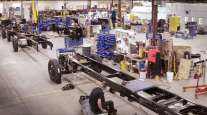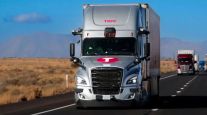Managing Editor, Features and Multimedia
Electric, Autonomous Trucks Hold Promise, Executives Say

[Stay on top of transportation news: Get TTNews in your inbox.]
LAS VEGAS — Autonomous and electric-powered trucks hold great potential to improve safety and efficiency in the freight transportation sector, but it will take time for these emerging technologies to overcome various market challenges and achieve widespread commercialization, industry executives said.
Panelists representing a truck manufacturer, an autonomous truck developer and a motor carrier shared their perspectives on the path to market for these emerging commercial vehicle technologies during a Feb. 1 session at the Manifest supply chain technology conference.
One current challenge for motor carriers interested in electrification is simply acquiring the equipment, said Craig Harper, chief sustainability officer and executive vice president at J.B. Hunt Transport Services Inc.
“What we’re anxious to do is to test the vehicles as soon as we can and see how they’re going to perform and where that potential payback could be, because all of these solutions have got to be commercially viable,” he said. “We can all have the greatest intentions and all the best desires, but if the company is not sustainable [financially] … then you won’t do anybody any good.”
Closing out another day at #Manifest2023 with a discussion on bringing autonomous and electric trucks to market with @NACFE_Freight, @DaimlerTruckNA, @jbhunt360 and @KodiakRobotics. pic.twitter.com/hq13aC8YnV — Seth Clevenger (@SethClevenger) February 1, 2023
He said J.B. Hunt ordered some electric trucks as far back as 2017 that the company still hasn’t received. The intermodal and trucking company also has encountered difficulty setting up vehicle charging.
Harper contrasted the scarcity of charging infrastructure for electric trucks with the abundant existing diesel fueling network established over the past half century.
“How are we going to replicate that in the EV space in a short period of time?” he asked. “That’s a real challenge.”
Harper predicted, however, that the cost and quality of electric trucks will improve rapidly, not unlike flat-screen televisions that once commanded a hefty premium before experiencing big price drops as sales increased.
“I think we’ll see something like that in the EV space,” he said. “The cost of the batteries will come down, the range will improve and the weight penalty will not be as great.”
On the autonomous vehicle front, Harper said he has been excited about the prospect of autonomous trucking since 2016, when the topic was still relatively new for most of the trucking industry.
“I’ve been very encouraged by what I’ve see through the years, and it’s very exciting times,” he said. “I think there will be a time when you will see autonomous trucks move certain types of freight on specific lanes.”

Host Seth Clevenger speaks with autonomous vehicle pioneer Don Burnette about the pros and cons of driverless cars and trucks. Hear the program above and at RoadSigns.TTNews.com.
Third of a three-part series on autonomous vehicles. Hear Part I here, and Part II here.
J.B. Hunt, based in Lowell, Ark., ranks No. 4 on the Transport Topics Top 100 list of the largest for-hire carriers in North America.
Much like the introduction of battery-electric trucks, the rollout of autonomous driving technology will be a gradual process, said James Reed, chief operating officer for autonomous truck developer Kodiak Robotics.
“There’s not going to be a light switch that flips where suddenly you’ll wake up in the morning and every truck is autonomous,” he said.
Although it will take time for autonomous trucks to reach the market in significant numbers, Reed said industry leaders should at least be learning about this technology now.
“I don’t think people need to be ready today,” he said. “I think they need to be contemplative of the future. I think they need to explore the alternatives that are out there.”
Reed, who recently joined Kodiak after departing as CEO of USA Truck Inc., reflected on his approach to emerging technologies while leading the Van Buren, Ark.-based truckload carrier.
“I realized as the CEO of a trucking company that there won’t be one ubiquitous solution, whether it’s EV or fuel cells or even autonomy,” he said. “I started thinking more about a portfolio approach to solving the problems that face everybody.”
While zero-emission vehicles tend to come up first in discussions about freight sustainability, autonomous driving also can support a cleaner and more efficient transportation system, said Joanna Buttler, head of Daimler Truck’s global autonomous technology group.
To bring autonomous trucks to market, Daimler has partnered with two developers of automated driving technology — its independent subsidiary Torc Robotics and autonomous vehicle firm Waymo. Both of those developers have been operating self-driving trucks on public roads with a safety driver behind the steering wheel.
Daimler also has developed an autonomous vehicle platform based on its Freightliner Cascadia model featuring redundant safety systems to serve as a backup in the event of a critical system failure in the absence of a human driver.
While Daimler has designed its autonomous-ready Cascadia with a diesel powertrain, Buttler said the development of autonomous driving and electric trucks could intersect in the future.
The truck maker’s approach to autonomy will be “propulsion agnostic,” Buttler said, “so we can apply the right propulsion technology for the right use case.”
Today, Daimler and its AV partners are designing autonomous trucks to transport freight on longhaul interstate routes in hub-to-hub operations — a use case that does not pair well with the limited vehicle range of today’s battery-electric technology.
Want more news? Listen to today's daily briefing above or go here for more info
In addition to battery-electric and autonomous trucks, panel moderator Mike Roeth mentioned the development of more advanced diesel and natural gas trucks, renewable fuels, hydrogen-powered trucks and connected vehicle technology.
“These are exciting times in freight movement and trucks,” said Roeth, who is executive director at the North American Council for Freight Efficiency.
As manufacturers and technology companies continue to make progress on electric and autonomous truck development, J.B. Hunt’s Harper encouraged industry leaders to experience technologies for themselves.
“Go out and get into one of these vehicles and see it firsthand,” he said. “I think you’ll be amazed at this technology.”




